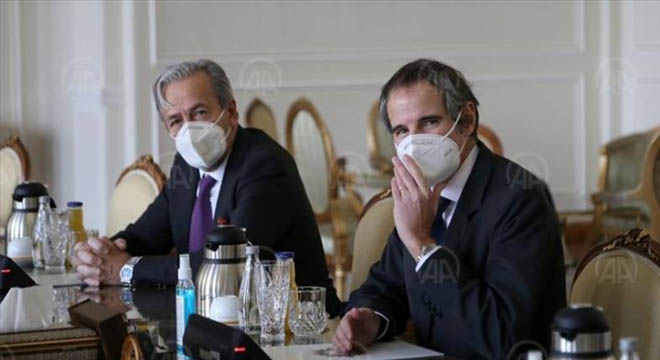UN nuclear watchdog chief Rafael Grossi held wide-ranging talks Sunday with Iranian officials in Tehran, including the head of Iran’s nuclear agency, Ali Akbar Salehi.
The talks centered around Iran’s cooperation with the International Atomic Energy Agency (IAEA) and recent measures taken by Tehran to scale down its commitments under the Joint Comprehensive Plan of Action (JCPOA), commonly known as the Iran nuclear deal.
In a statement issued late Sunday after concluding his day-long visit, Grossi said the IAEA will “continue the necessary verification and monitoring activities” for up to three months.
He confirmed that the Additional Protocol to the Non-Proliferation Treaty (NPT) will be suspended by Tehran on Feb. 23 in line with a recently passed law, which will make access to Iran’s nuclear sites more limited for the agency’s inspectors.
While terming the move “unfortunate,” the IAEA chief said the two sides have agreed on a “special bilateral arrangement” that can help maintain the agency’s oversight.
“We will have less access [to nuclear sites], but we have maintained the level of oversight we needed with this agreement. In fact, we arrived at a temporary solution,” he noted.
The visiting UN official said the “technical understanding” reached between the two sides during Sunday’s talks can lead to a place where “political negotiations” will take place.
Earlier, Kazem Gharibabadi, Iran’s ambassador and permanent representative to international organizations in Vienna, said the talks were “fruitful” and “based on mutual interest.”
Grossi, who arrived in Tehran on Saturday, timed his visit to Iran two days ahead of the country’s deadline to stop implementation of the Additional Protocol to the NPT.
Move reversible
While the official expressed concern over Iran’s proposed plan, which will make Iranian nuclear sites restricted for IAEA inspectors, Iranian officials stressed that the move is reversible if the US and EU fulfill their obligations and sanctions are lifted, sources said.
Iran’s nuclear chief also reportedly raised the issue of the “leak of confidential information,” urging the UN nuclear watchdog to review its safety mechanisms to prevent such occurrences.
Pertinently, the Iranian mission at the IAEA had earlier this month raised concerns over the protection of confidential information related to Iran’s nuclear program.
Grossi also held talks with Foreign Minister Javad Zarif. Among the issues that figured in their discussions were Iran’s cooperation with the IAEA under the framework of the safeguards agreement and the agency’s efforts in resolving bilateral issues, the statement said.
It was the UN official’s second visit to Tehran since taking over as chief of the UN nuclear watchdog. His first visit came in September last year at the invitation of Iran.
On Friday in a tweet, he said his visit to Tehran was aimed at “finding a mutually agreeable solution compatible with Iranian law” so that the IAEA can “continue essential verification activities in Iran.”
The whirlwind visit came after Iran last week informed the IAEA of its plan to “suspend the country’s voluntary actions” in line with the recent law.
Iran is slated to stop the implementation of the Additional Protocol to the NPT on Tuesday, although compliance with its safeguards agreement will continue, according to officials.
In view of these developments, European countries have stepped up efforts to revive the 2015 nuclear deal and de-escalate tensions between Iran and the U.S.
On Thursday, top diplomats from European countries met in Paris to find ways of salvaging the nuclear accord. US Secretary of State Antony Blinken also took part via videoconference.
Iran’s Deputy Foreign Minister Abbas Araqchi said Saturday that the country was considering the EU’s offer to host an informal meeting between Iran and other signatories to the 2015 accord.
“We are considering [EU foreign policy chief Josep] Borrell’s offer and are engaged in consultations with our other friends and partners like China and Russia,” he said in a televised interview.
‘Action, not words’
Zarif, in an interview with state TV on Sunday, said the negotiations will commence when “all sides fulfill their obligations” under the 2015 nuclear agreement.
On the coming deadline, he said the UN nuclear watchdog will not have access to tapes and footage from the cameras in Iranian nuclear facilities beyond the deadline unless the US lifts sanctions.
The top Iranian diplomat stressed that ceasing the implementation of the Additional Protocol “does not mean violating the nuclear agreement,” saying Iran “does not seek nuclear weapons.”
Meanwhile, a total of 226 Iranian lawmakers in a statement Sunday insisted that the recently passed law should be implemented on Feb 23, since the European signatories to the 2015 nuclear accord have failed to fulfill their commitments.
The parliamentarians said the US return to the deal would be possible only after the “practical and verifiable termination of the banking and oil sanctions” against Iran.
A group of Iranian students also held a demonstration Sunday in front of the Atomic Energy Organization of Iran (AEOI) building in Tehran during Grossi’s visit, demanding the expulsion of UN nuclear inspectors from the country.
President Hassan Rouhani earlier this week said the IAEA inspectors will not be expelled and they will continue to monitor Iran’s nuclear activities.
Follow the PNI Facebook page for the latest news and updates.









